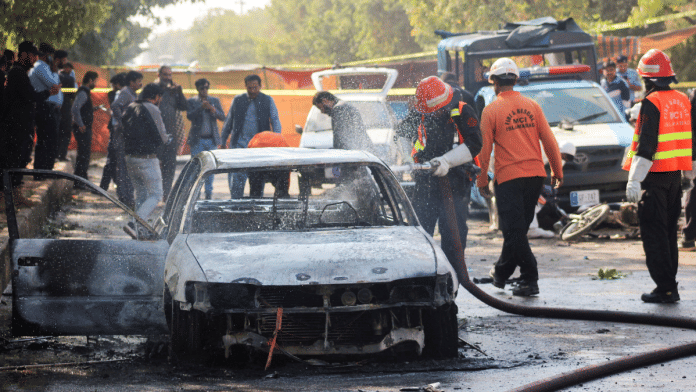New Delhi: Pakistanis are no longer fanning over their field marshal. They are now blaming the military establishment for the crisis of national security.
“The war has come to the cities. Amendments and immunity won’t stop it,” journalist Zarrar Khuhro wrote on X after a suicide bombing rocked the capital city of Islamabad Tuesday.
The bombing follows an attack on Wana Cadet School in northwest Khyber Pakhtunkhwa’s Wana district, near the Afghan border.
Twelve people were killed and 36 others injured when a suicide bomber detonated explosives outside the district and sessions court in Islamabad. The attack took place as Pakistan was hosting major international events, including the Inter-Parliamentary Speakers’ Conference and the sixth Margalla Dialogue, while a cricket match between Pakistan and Sri Lanka was underway in nearby Rawalpindi.
“This looks like the early 2000s wave of terror, but worse. More sophisticated and far better equipped and funded,” Khuhro added.
A Dawn editorial didn’t mince words and acknowledged the rise in terrorism the country is experiencing.
“The state’s primary duty right now is to shore up the home front, and re-examine its counterterrorism strategy in the wake of the resurgence of militancy. For long, Pakistan’s major cities have been immune to mass-level terrorist attacks. The fact that a suicide bomber was able to strike in Islamabad indicates a major security lapse,” the article read.
“Pakistan is faced with a 3 front security challenge,” wrote former ambassador Maleeha Lodhi. And Pakistanis on social media had a consensus—the only challenge is the military establishment.
“Actually, it’s just a single front; the rest two are the outcomes of that,” Pakistani analyst Hussain Nadim replied to Lodhi’s post.
A X user simply wrote, “1: G 2: H 3: Q”, referring to the army headquarters.
Gull Nawaz Bugti, a member of the Baloch Republican Party, took it a step further. “Correction: Pakistan ‘is’ the 3 front security challenge,” he wrote.
Another X user noted sarcastically: “Obviously, adding yet another title will surely fix everything.”
Also read: Pakistan’s constitutional amendment ‘can inspire Kim Jong Un,’ people say. Dark days ahead
‘Disasters to come’
Even experts are voicing concerns.
“Terrorism in Pakistan stems from governance failures, not just militancy, demanding reform, justice,” wrote Syed Akhtar Ali Shah, a former Secretary to Government, Home and Tribal Affairs Department, in an op-ed for Express Tribune.
“Counterterrorism cannot rely solely on force. States must also address governance failures that create fertile ground for extremism. Good governance — a term often cited in political manifestoes and international frameworks — rests on principles of welfare, security and justice. But Pakistan continues to suffer from systemic governance deficiencies that have undermined peace, development, and stability,” he added.
X user Asim Mardan, an almost namesake of the field marshal, called it a distraction from the 27th Constitutional Amendment. “It’s just a distraction from what they have done to the constitution,” he wrote.
Pakistan is in the process of altering its constitution to grant lifetime immunity to their field marshal and alter the structure of their judiciary. The changes have faced massive opposition from policymakers, politicians, lawyers, and civil society—but to no avail.
“There seems to be nothing but war in the future. War and a thousand bleeding cuts. Hope never to have lived through these days again but here we are,” Khuhro wrote.
And then there are the disgruntled Imran Khan supporters.
“Under Imran Khan, Pakistan was stable & secure. Today, even our capital, Islamabad, is no longer secure. Instead of protecting the people, state forces are occupied with suppressing Imran Khan’s family, while Asim Munir seeks lifetime immunity & the 27th Amendment takes priority,” wrote Mubarak Khan.
An X user pins the entire blame on Munir. “The Achilles heel of this god-awful fiasco is none other than Sultan al Khawarij himself,” he wrote. Munir uses ‘al-khawarij’ as a term for foreign militants.
Analyst Hussain Nadim sees a rough future for Pakistan.
“Even the blind can see what has hit the country, and what more disasters are yet to come unless major course correction isn’t done… The fundamentals of state, society and governance have already collapsed in Pakistan; what we are witnessing now is unraveling,” he wrote on X.
(Edited by Prasanna Bachchhav)






